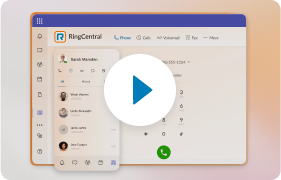Sales calls are an excellent opportunity to lay the groundwork for trust and long-lasting, mutually beneficial relationships with your potential customers. In many ways, that beats making a quick, easy one-off sale.
With practice, anyone can learn to forge those connections. How, you wonder? By building rapport. Because that’s the building block for any successful sales relationship.
That’s why knowing how to build rapport is such an essential skill for any rep. In this article, we’ll cover key concepts and proven strategies for connecting with people on a deeper level and how that can help you close more sales.
Why Do You Need to Build Rapport on Sales Calls?
You walk into an electronics store to buy a new TV, and a salesperson slides up to you and tries to nudge you into buying a projector instead. But they don’t ask about your needs or try to set a tone. Instead, they immediately begin rattling on about the technical specs of the latest projector and how it beats using a TV.
Now, picture a different scenario where they say “hi” before asking engaging questions about the layout of your living space, your budget, and even how your choice will fit in with your other gadgets. They actively listen and don’t use that irking “sales-like” tone.
It’s more likely that both parties will arrive at a common goal in the second situation. Why? Because the rep placed your needs and feelings on a pedestal and looked to establish an authentic connection. Rapport is a harmonious relationship where there’s mutual trust and respect. It’s key to successful lead generation marketing.
Many reps dial a prospect’s phone number and are immediately hit by skepticism that’s almost palpable. Understandable because they’re bombarded by sales pitches every day — many of them pushy. So, it makes sense that they’re guarded and seemingly uninterested.
If you are cold calling, you need to find the balance between building rapport and getting right into the pitch. You are disrupting someone’s day, so you need to work quickly with enthusiasm and confidence.
Establishing a connection is like building a bridge over that icy moat. And don’t make the mistake of thinking you only need to build rapport with a key decision-maker. After all, every interaction plays a role (directly or indirectly) in the decision-making process. You never know the allies you’re creating who can advocate for you internally.
How to Build Rapport in Your Sales Calls
There’s more to building rapport than making a good first impression. Nearly five in ten customers will pay more for a product or service from a brand they trust. But trust can be a long, drawn-out process involving repeated interactions and positive experiences.
How do you set the pace from your first sales call so that prospects are leaning towards trusting you by the time you drop the call?
Let’s explore some tips you should definitely infuse into your sales calls for maximum rapport-building effect (as well as those you must refrain from doing)
The Do’s of Building Rapport in Sales Calls
These tips will help you to build trust and establish credibility with your prospects on your sales calls. Ultimately, they increase your chances of closing deals.
1. Do Your Homework
Nothing screams “unprepared” than hopping on a sales call and fumbling with basic knowledge of your prospect’s company or industry. That’s guaranteed to lose their trust before you even have a chance to gain it.
Instead, you want to conduct detailed research into their company, industry, mission, objectives, targets, customer journey, and challenges. Know who the key decision-makers are. Tools like LinkedIn’s Sales Navigator can help you gather the insights you need.
Trust me, it’s not wasted effort, considering most customers don’t feel understood. That’s why the top sellers invest up to six hours weekly researching their prospects, according to Crunchbase.
2. Do Start With a Warm Greeting
Some reps make the mistake of jumping right into the pitch as soon as the prospect gets on the call. But how do you build rapport by coming across as pushy and impersonal? That only makes the prospect feel like a target.
A simple “Hi [Prospect’s name], it’s great to talk to you. I’m [Your name] from [Your company]. I hope you’re having a great day” will help to establish a friendly atmosphere and set the stage for a positive relationship. The important thing to do here is transition into a pitch quickly so you don’t lose your audience.
Don’t overdo the chattiness, though, or it will come across as an act.
3. Do Ask Open-Ended Questions
Rapport thrives on a sales call when there’s two-way communication, not you just droning on and on with an occasional interjection from the prospect.
Besides, if they’re not sharing, there’s no way you can build a deeper understanding of their pain points and tailor your pitch accordingly.
Use the five Ws to side-step a one-sided conversation and involve your prospect: who, what, where, when, and why. “How” questions are also great.
For instance, instead of asking, “Are you satisfied with your team’s current communication tools?” you could go, “What communication challenges does your team face when working remotely or across different locations?”
4. Do Listen Actively
Sure, you’re on a sales call to communicate the value of your product. But when you’re doing all the talking, you’re missing out on a big opportunity to connect. Active listening is one of the best interpersonal skills and dials back to a previous point about two-way communication.
What is active listening anyway? It’s more than just hearing the words your prospect is saying. It involves mutual attentiveness.

Image sourced from Pexels
You want to pay rapt attention to their body language. How’s that possible on a call, you wonder. In a physical sales meeting, you’d watch out for non-verbal cues, body movements, and body postures and try to maintain eye contact while listening.
On your sales calls, listen for pauses and changes in volume. Focus on their tone of voice and the pace of speech. Are there any pauses and hesitations? Active listening can help you pick up on subtle signals and reveal cues you’d ordinarily miss.
5. Do Personalize Your Approach
You’ve done your homework, remember? Make that evident so your prospect feels special and can see themselves trusting you and your product. You can’t do that if it looks like you’re reciting a generic sales pitch.
Here are some tips that can help:
- Practice your script before the call to know your key points. You don’t want to read it word for word, and you don’t want to be caught off guard when someone answers the phone.
- Tailor your examples to their needs and pain points.
- Use the prospect’s name or their company name, or even better their previous experience, — “So, what were your experiences with our conference call services like during your last round of webinars in March, [name]?”
Now, that’s a great rapport-building question. In one fell swoop, you asked an engaging question, personalized it with their name, and showed that you did your homework. Now they know you’re genuinely interested in their experiences.
6. Do Find Common Ground
Rapport building can be slow, but finding common ground allows you to hit it off quickly. Here’s why: even though sales calls are in professional settings, personal connection cements stronger connections. Did/do you:
- Go to the same university?
- Support the same sports teams?
- Grow up or work in the same city?
- Have any hobbies or interests in common?
Also, building instant rapport is easier when you have shared experiences with your potential client. A short, entertaining story highlighting your experience that relates to something they’ve said or you learned about can be a great ice-breaker and lead to deeper conversations.
7. Do Match and Mirror
Even if you can’t find any relevant connections you share with your prospect on a personal level, mirroring can be an effective shortcut to good rapport. It’s a technique where you mimic a potential customer’s behavioral characteristics. You could mirror:
- Communication style. Don’t be stiff and formal when they’re leaning towards casual, for instance.
- Body language. You could subtly match their gestures or postures on a video call.
- Pace of speech. Adjust your speaking speed to match theirs.
- The tone of voice. Enthusiastic, serious, or casual — try to mirror their tone of voice.

Image sourced from Pexels
The trick with sales mirroring is keeping it subtle. If you go over the top and your prospect catches on, they may get the feeling that you’re mocking that behavior — and there’s little chance of salvaging things from that point. This takes practice, and while it may not feel genuine to you, if you practice and are confident in the conversation it will come across that way.
The Don’ts
Here are some pitfalls to side-step while trying to build a strong rapport with customers:
- Don’t Overdo the Small Talk
Small talk is a great tool in your rapport-building toolkit because it makes things feel natural and gives you hints about your prospect’s state of mind. But after a certain point, it begins to feel superficial and even distracting. You don’t want to get caught up here, as you may lose the opportunity to get your message across.
As soon as you feel like you’ve established a basic connection, it’s time to move on to a more meaningful conversation relevant to the customer.
- Don’t Dominate the Sales Call
Sure, the purpose of the call is to share your value proposition. But remember that building a relationship is the best way to cement your pitch in a prospect’s mind. Many reps make the mistake of talking too much and turning off their prospects — and their success rates reflect that.
Instead of dominating the sales call and shilling your product, you want to be a part of it. A good rule of thumb is to aim for a 50/50 ratio where you’re listening as much as you’re talking. After your short pitch, always end if it with a question- no ultimatums or yes/no questions.
Final Thoughts
There’s little to no chance of closing a sale if you don’t get along with your prospects. You don’t have to become best friends, but building rapport ensures that your leads feel valued and connected to you. Failing to do so is a missed opportunity.
However, balance is crucial, which is why we emphasized some great to-dos in this article, as well as pitfalls to avoid. You want to leave every sales call feeling like you have set the stage for meaningful relationships that will benefit both parties in the long run.
FAQs
How can you start building rapport before getting on a call?
Practicing your sales pitch will help you avoid reading it verbatim and make it sound natural. What’s more, do your research. Learn enough about your prospects to connect with them and display your interest in their business and challenges.
What are 7 steps to build rapport?
Try these techniques to build rapport in your sales calls:
- Do your homework
- Start With a Warm Greeting
- Ask open-ended questions
- Personalize your approach
- Find common ground
- Match and mirror
What is rapport in sales?
Rapport is the development of a harmonious relationship between a rep and a potential customer that involves mutual trust, understanding, and respect.
Updated Mar 13, 2025












